Tine's Visit to Prospero's Isle
Tine and Rubob set off for the Meadows by the river on their walk this afternoon. Tine, who was suffering from a cold, thought a trip to the fields might do some good.
"This pure stinging cold is an elixir to the lungs," Thoreau wrote in his essay "Walking," and Tine had taken note.
At the old stone bridge, Tine stopped to look out over the water and fields.
She and Rubob didn't say much; they just took in the view.
On the path alongside the Pequabuck River, Rubob seemed lost in a tangle of thoughts.
"What are you thinking about, Rubob?"Tine asked -- "something in the news, I expect." Rubob had been engrossed in his newspapers all morning.
"The Canadian elections, Tine," Rubob said.
Tine's mind was filled with little more than the open fields. That might be considered a bit empty-headed, what with everything that needed thinking about in the world; but it was refreshing for Tine, who'd felt heavy-headed with her cold all morning.
But then Tine began to reflect, as she often does on her walks. She was hoping the fields might work their magic and clear her head, the way they did for Martin Heidegger in his essay "Conversations on a Country Path." Heidegger's open fields became an "enchanted region where everything belonging there returns to that in which it rests." He wrote:
"That-which-regions is an abiding expanse which, gathering all, opens itself, so that in it openness is halted and held, letting everything merge in its own resting. "But that kind of thing doesn't happen for the asking, Tine thought. Even waiting for it to happen isn't all that simple. Heidegger wrote:
The third man on the path then piped up:Teacher: Perhaps we now are close to being released into the nature of thinking ...
Scholar: ... through waiting for its nature.
Teacher: ... Waiting, all right; but never awaiting, for awaiting already links itself with re-presenting and what is re-presented. Scholar: Waiting, however, lets go of that; or rather I should say that awating lets re-presenting entirely alone. It really has no object....
Teacher: In waiting we leave open what we are waiting for.
Scholar: Why?
Teacher: Because waiting releases itself into openness ....
Scientist: As I see more clearly just now, all during our conversation I have been waiting for the arrival of the nature of thinking. But waiting itself has become clearer to me now and therewith this too, that presumably we all became more waitful along our path.
Teacher: Can you tell us how this is so?
Scientist: I am to say why I came to wait and the way I succeeded in clarifying the nature of thinking. I tried to release myself of all re-presenting, because waiting moves into openness without re-presenting anything. And released from re-presenting, I tried to release myself purely to that-which-regions because that-which-regions is the opening of openness.
Tine thought her thinking wasn't becoming any more clear. Her head was feeling rather clogged with ideas, and she thought it might be best to quit awaiting "that-which-regions." She sneezed, and that cleared her head to some extent; but the Meadows, while certainly beautiful, didn't seem like an enchanted region -- simply cold and vast. If Tine had been included in "Conversation on a Country Path," Heidegger might have written:
Tine: I tried to release myself purely to that-which-regions and the best I could do was sneeze.
"Look," she said to Rubob, "a tree in the abiding expanse of that-which-regions."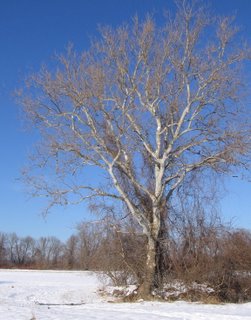
"A tree in what, Tine?" Rubob asked distractedly.
"Nothing Rubob," Tine said -- "just a tree, but a rather nice one, don't you think?"
Rubob didn't respond; he was still lost in his thougths.
"Still thinking about the election, Rubob?" Tine asked.
"The leader of the Liberals has been dethroned, but the thing is, Tine, that the Conservatives won only about 120 seats in parliament, far short of the 150-plus seats they need for a majority."
The two passed another tree, a sycamore, and Tine pointed out a nest.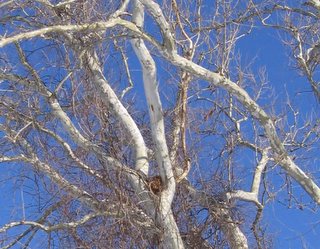
"The nest is held in the abiding expanse, letting everything merge in its own resting, Rubob," Tine said.
"What, Tine?" Rubob asked.
"Nothing, Rubob. I don't really see it, either," Tine said.
"Heidegger, Tine?"
"You got it, Rubob," Tine said.
They continued on the path to the confluence of the Pequabuck and Farmington rivers. It was a place where ducks liked to gather.
They fled at first when they saw Tine standing on the riverbank. Rubob was standing farther back, attending to affairs of state, lining up his ducks in parliament.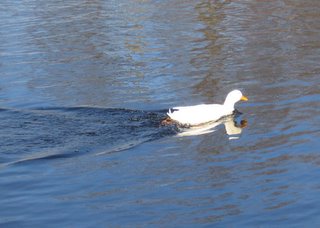
Gradually, though, the ducks got used to Tine, and they returned to investigate.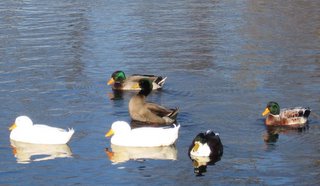
A second flock came to have a look, sending the first group down the river.
"The king and his courtiers, Rubob," Tine said.
"Look at the beautiful reflections in the water, Tine," Rubob said.
And looking at a pair of ducks he sang,
"Birds do it, bees do it
Even educated fleas do it
Let's do it, let's fall in love."
"Cole Porter, Tine," Rubob said.
Across the river, a mansion overlooked the fields and streams, and a smaller brick cottage on the estate was perched on a hillside."It is nature that is all
Simply telling us to fall in love."

The two turned back on the path, and Tine said, "We live in a funny sort of village, Rubob. It's timeless in a way. Why do we still get aerograms and telegrams, for example, when everyone in the world at large gets e-mail or some such thing? Isn't that a very curious thing?" (Tine was referring to mail she'd received requesting pictures of the hot water bottle that figured so prominently in her blog: Tine's Hot Water Bottle).
"Our village is like the island in Shakepeare's 'Tempest,' Tine," Rubob said. He'd been re-reading 'The Tempest' the past few nights in bed.
"How so, Rubob?" Tine asked.
"It's a magical place, not really of this world. It's not on any maps. It's a place of magical visions and sounds, magical beings, of spirits and sprites, like Ariel."
"What's it about, Rubob?"
"There's an apparent shipwreck, Tine, but nothing's ever as it seems in 'The Tempest.' Prospero the magician has created a storm at sea to put his enemies, who are aboard a ship sailing by the island, at his disposal. He's the deposed duke of Milan, and he's been living on the island with his daughter, Miranda, for twelve years. The men on the ship are all those who deposed him, and now his plan is to depose them."
John William Waterhouse, 'Miranda-The Tempest.'
From http://www.mcgoodwin.net/pages/otherbooks/ws_tempest.html
"What's he like, Rubob -- Prospero?" Tine asked.
"He's not really of this world, either, Tine -- like the island. He's always involved in his books and his magic. In fact, it was when he was absorbed in his studies of literature and sorcery that his brother, Antonio, teamed with the King of Naples, Alonso, to depose him as duke. Prospero and his daughter were banished and abandoned at sea. That's how they wound up on the island. But now, with the shipwreck caused by Prospero's magic, his enemies are all at his mercy on the island."
Rubob's mood seemed lighter when he was talking about 'The Tempest,' when he wasn't preoccupied with politics, Tine thought.
They passed the same tangle of branches they'd passed before, and this time Tine saw a glimpse of water in the thicket of vines.
"Through a long series of dreamlike events, Prospero is restored to his dukedom and reconciled with his enemies," Rubob said. "The reconciliation revolves around the marriage of his daughter, Miranda, to Ferdinand, the son of the King of Naples."
"With the reconciliation accomplished, Prospero calls to the magical 'elves of hills, brooks, standing lakes and groves,' renounces his magic, and breaks his magical staff:
'But this rough magic I here abjure ..."In the end, Prospero plans to return home to Naples and retire, Tine," Rubob said.
I'll break my staff,
Bury it certain fathoms in the earth,
And deeper than did ever plummet sound
I'll drown my book. '"
"What about the wrecked ship?" Tine asked.
"It hasn't been wrecked after all, Tine," Rubob said. "It's safely anchored off the island."
"How's that, Rubob?"
"It's a place where nothing's quite real -- it's all magical, always in flux, changing," Rubob said. "It's all part of the plan conceived by Prospero, who controls the flow of events on the island. At one point, when Prospero is near the end of his plans, he gives his great speech about our being "the stuff that dreams are made of."
Tine looked up the speech later when she got home:
"Our revels now are ended. These our actors,
As I foretold you, were all spirits and
Are melted into air, into thin air;
And, like the baseless fabric of this vision,
The cloud-capped towers, the gorgeous palaces,
The solemn temples, the great globe itself,
Yea, all which it inherit, shall dissolve,
And, like this insubstantial pageant faded,
Leave not a rack [cloud] behind. We are such stuff
As dreams are made on, and our little life
Is rounded with a sleep."
"That speech is said to be Shakespeare's own farewell, too, because it's his last play," Rubob said, as he and Tine were nearing the bridge where the path left the Meadows. "Shakespeare was leaving the stage with Prospero. 'I'll retire me to Milan,' Prospero says, where every third thought shall be my grave.'"
Looking back at the Meadows, Tine thought they seemed transformed somehow. It was the same scene that had presented itself to them when they entered the fields, but it seemed to have within it something that suggested Prospero's island.
It was, Tine thought, an "enchanted region where everything ... returns to that in which it rests" -- as though Prospero had buried his magical staff right there in Heidegger's country path.
"Patrick Stewart played Prospero in 'The Tempest' on Broadway a couple of years ago, Tine," Rubob said.
"Capt. Jean-Luc Picard," Tine said. "Well, I'll be. I saw him in 'Cyrano de Bergerac' on Broadway, and we both saw him in 'A Christmas Carol.'"
"There was a funny moment in 'The Tempest,' I remember reading," Rubob said. "Patrick Stewart was making a speech as Prospero when he tugged with both hands at his tunic, the way he did on the bridge of the Enterprise in 'Star Trek.' The audience burst out laughing. The story I read on it said, 'The gesture was not repeated.'
"Another metamorphosis in the dreamlike 'Tempest,' Rubob," Tine said. "I suppose Capt. Picard was a strong enough character to depose even Prospero."
"That's true, Tine," Rubob said.
The two walked up Meadow Road toward the village, and when Tine reached home she rushed in to get Rubob's worn paperback copy of 'The Tempest.'
An essay at the back of the play, called 'Fields of Light' and written by Reuben Brower, began with this poem by Andrew Marvell:
"The Mind, that Ocean where each kind
Does streight its own resemblance find;
Yet it creates, transcending these,
Far other Worlds, and other Seas."
Thinking back over her walk in the Meadows with Rubob, Tine thought, "All in all, a very pleasant walk."
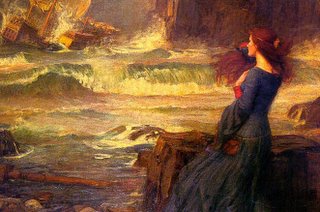


<< Home